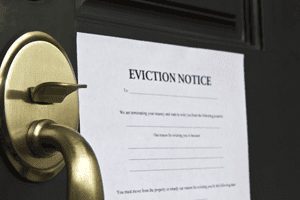Forfeiture of Lease 2021
It is possible for a landlord to unwittingly lose the right to forfeiture of lease by taking steps that recognise the continued existence of the lease.
This is where the landlord or an agent acts explicitly by recognising the continued existence of the lease and communicating this to the tenant.
However, under the Coronavirus emergency legislation, the government has made it is easier for landlords to openly discuss the tenant’s debt without necessarily losing the right to forfeit.
Currently, due to COVID-19, the government has passed legislation that prevents commercial landlords from evicting tenants.
It is also extending the restrictions on the use of Commercial Rent Arrears Recovery (“CRAR”), which is the process of seizing control of tenants.
It is essential to check what emergency legislation is in place when taking any legal action against the tenant.
Can a landlord end a commercial lease early?
Most commercial leases contain a “forfeiture of lease” clause allowing the landlord to forfeit the lease if the tenant is in breach. This is usually for non-payment of rent, insurance premium overdue money or service charges.
You should read your contract very carefully and check what forfeiture clause may be applicable, if any.
However, you may be able to take any action against the tenant if the tenant is receiving Mental Health Crisis treatment and or is seeking legal advice from a debt advice provider.
If the tenant is receiving Mental health crisis treatment. In that case, you may wish to consider giving the tenant reasonable time to sort things out.
The breathing space legislation will allow a reasonable period of time if the tenant receives mental health crisis treatment.
Commercial property leases generally have a Forfeiture clause which generally landlords were able to invoke for rent arrears.
However, due to the emergency COVID-19 legislation, creditor action may not be taken if the tenant receives advice from a debt adviser.
 How can I end a commercial lease?
How can I end a commercial lease?
Should a commercial tenant be in breach of covenant, such as having failed to pay rent, a landlord may instruct enforcement agents (bailiffs) to forfeit the lease.
The landlord must communicate an explicit intention to bring the lease to an end.
If a tenant wished to terminate the lease they should contact the landlord and negotiate the termination.
Defaulting on a commercial lease?
The common breach of covenant for a commercial lease is the obligation to pay rent. If the tenant fails to pay rent when lawfully due, the landlord can terminate it.
Rent arrears is also one of the easier breaches to deal with.
When can I forfeit a commercial lease?
Most commercial leases contain a “forfeiture of lease” clause allowing the landlord to forfeit if the tenant breaches the lease terms. The standard and most accessible grounds to terminate a contract is the non-payment of rent or outstanding insurance monies.
What happens if a lease is forfeited?
To successfully forfeit a commercial lease, you will need to prove a right to do so. Commonly, landlords can rely on a specific covenant within the contract that has been breached.
However, landlords need to be cautious if a tenancy is forfeited when the right to forfeit has not arisen. The tenant may bring a claim for wrongful forfeiture.
It is therefore essential to obtain legal advice as soon as a breach occurs.
What happens if a commercial tenant dies?
If the tenant is a limited company, the company may continue to trade, or the executors may take steps to wind up the company. If the lease is in a person’s name, the executors will deal with the deceased assets, including the lease.
The landlord should contact the executors of the deceased as soon as possible. So they know their intention regarding the tenancy.
Can I walk away from a commercial lease?
You should contact the landlord and negotiate to bring the tenancy to an end by proper means.
The landlord has the legal right to pursue any debt if the lease has not been bought to an end by the consent of all parties concerned.
If you are struggling to service the rent and have fallen into rent arrears you should contact the landlord or agent to discuss a payment holiday.
Find out what your rights are by contacting a professional debt advice company and find out more about the breathing space debt. Tenants have protection until March 2022 against business debt during the Moratorium period.
What does forfeiture mean in legal terms?
“Forfeiture of lease” is a term used when a landlord is ending a commercial lease. This is attained by the landlord using their contractual right to end the lease by gaining peaceable possession. It can only be done if the tenant has breached a vital term of the lease.
A landlord may instruct a bailiff to take peaceful possession of their commercial property. This will then achieve forfeiture of the lease. It is a quick and effective way to get your property back or get a tenant to pay.
Ending the lease does not stop the rent from still being payable and leaves the tenant open to contractual or other enforcement action.
Is insolvency a once and for all breach?
An insolvency event, such as a tenant going into administration, can restrict a right to forfeit, even in situations where the landlord has already taken steps to issue forfeiture proceedings.
Relief from forfeiture for commercial tenants
A tenant can ask a court to provide relief from forfeiture (i.e., stop it from happening), and the court has the legal discretion to consider this.
An application to the county court may be made by a tenant immediately after the landlord has exercised forfeiture.
Notice of forfeiture
Notice of forfeiture (Section 146 Notice) is frequently used by commercial landlords.
A Section 146 Notice is issued under section 146 of the Law of Property Act 1925. Notice 146 warns the tenant that they are in breach of covenant (other than the covenant to pay rent). Notice section 146 is the intention of the landlord to forfeit the lease.
Forfeiture proceedings
Landlords should consider the following before taking legal proceedings to forfeit the lease.
- Is the forfeiture of lease appropriate under the circumstances?
- Ongoing forfeiture Court’s proceedings may get caught by the ban.
- The two options available to commercial landlords with commercial premises are forfeiture by peaceable re-entry or issuing court proceedings.
Forfeiture of lease process
The regulations surrounding the forfeiture of a commercial lease is a complex area of law. There is a process to follow failure to do so means the landlord will lose their right to forfeiture.
You should seek legal advice before taking any action and be aware of the emergency coronavirus legislation.
 Ban on forfeiture
Ban on forfeiture
The forfeiture proceedings already in the Courts will also be caught by the eviction ban of commercial tenants.
The first introduction of the forfeiture moratorium was in March 2020. This was part of the emergency Coronavirus Act 2020. It was initially thought to be a short-term measure that was to end on 30 June 2020. However, it was extended, and the protection was until 31 December 2020.
It has again been extended to March 2022.
External Links
- Coronavirus Act 2020
- The Taking Control of Goods and Certification of Enforcement Agents (Amendment) (Coronavirus) Regulations 2020
- Practice Direction 51Z: stay of possession proceedings, coronavirus
- Practice Directions 55C – coronavirus: a temporary provision in relation to possession proceedings
- Code of Practice for commercial property relationships during the COVID-19 pandemic
Author: Simon Hampton Date: 1st of January 2024
Our top read blogs:
Debt respite Scheme: Tenant breathing space legislation guide for landlord
Government extends moratorium on commercial property evictions to March 2022
Best Landlords Association to join in 2021?
Landlord Electrical Safety inspection report (EICR) 2021 Guide


 How can I end a commercial lease?
How can I end a commercial lease? Ban on forfeiture
Ban on forfeiture


